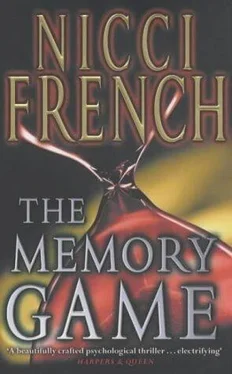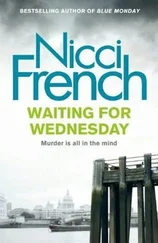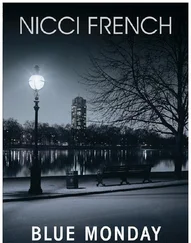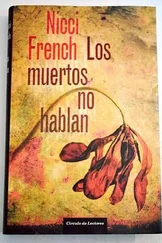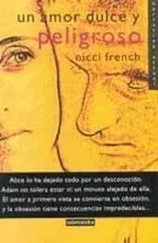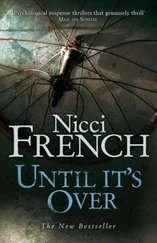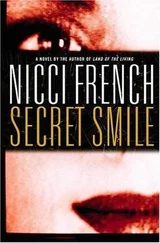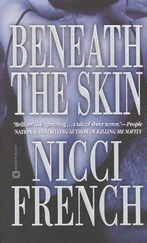Nicci French - The Memory Game
Здесь есть возможность читать онлайн «Nicci French - The Memory Game» весь текст электронной книги совершенно бесплатно (целиком полную версию без сокращений). В некоторых случаях можно слушать аудио, скачать через торрент в формате fb2 и присутствует краткое содержание. Жанр: Триллер, на английском языке. Описание произведения, (предисловие) а так же отзывы посетителей доступны на портале библиотеки ЛибКат.
- Название:The Memory Game
- Автор:
- Жанр:
- Год:неизвестен
- ISBN:нет данных
- Рейтинг книги:4 / 5. Голосов: 1
-
Избранное:Добавить в избранное
- Отзывы:
-
Ваша оценка:
- 80
- 1
- 2
- 3
- 4
- 5
The Memory Game: краткое содержание, описание и аннотация
Предлагаем к чтению аннотацию, описание, краткое содержание или предисловие (зависит от того, что написал сам автор книги «The Memory Game»). Если вы не нашли необходимую информацию о книге — напишите в комментариях, мы постараемся отыскать её.
The Memory Game — читать онлайн бесплатно полную книгу (весь текст) целиком
Ниже представлен текст книги, разбитый по страницам. Система сохранения места последней прочитанной страницы, позволяет с удобством читать онлайн бесплатно книгу «The Memory Game», без необходимости каждый раз заново искать на чём Вы остановились. Поставьте закладку, и сможете в любой момент перейти на страницу, на которой закончили чтение.
Интервал:
Закладка:
Fanny made her entrance backwards, pulling a heavy case into the room. She turned round and looked seriously at us all.
‘I’m a traveller,’ she said. She came to a halt at my knees, and considered me for a moment with Caspar’s grey eyes. ‘Who are you?’
Caspar made no move to intervene, just waited for me to reply.
‘Jane.’
‘Tell me all the words you can think of that rhyme with Jane. Ready-steady-go.’
‘Lane, mane, deign, feign, cane, pain, rain, same, vain, grain, chain, arcane…’
‘Now with Fanny. Go!’
‘Danny, Annie, Mannie…’
‘Those are all other names. I want real words.’
‘Canny, granny…’
‘What does canny mean?’
‘Knowing, I suppose. Like you.’
‘At school, people say that Fanny means vagina. They chant, “Fanny has a fanny”. Do you think that’s what it means?’
‘Lots of words have different meanings. For some people fanny does mean vagina; for me, Fanny now means a five-year-old girl who’s a traveller. When I was at school, people used to chant “Plain Jane Crane”.’
Caspar stood up and said to Fanny, ‘Come on, then. Bedtime for you. We’ll read a chapter of Pippi and leave our guests on their own for a few minutes, shall we? You know where the wine.’
She held up her arms, starkly vertical, and he hoisted her onto his shoulders.
‘More wine, Jane?’
‘Half a glass.’
I put up a hand to signal it was enough and our fingers met. I could not breathe. My stomach turned to water and my heart flipped like a fish.
‘So how did you meet Caspar?’ the man next to me asked: Leonard, who worked in the Hospital for Tropical Diseases and had just come back from Angola.
‘I sat next to her at a public meeting and she shouted at me,’ interrupted Caspar.
‘And then he came to a residents’ association meeting I was involved in, and he got punched in the eye.’
‘For such a pacifist,’ said Carrie from across the table, ‘you get in an awful lot of fights. Weren’t you hit by a down-and-out for trying to give him money?’
‘It was a misunderstanding.’
‘Obviously,’ said Eric with the red hair and bitten nails, ‘and that old lady in the supermarket when you walked off with her shopping trolley. You can still see the scar in the right light.’
It had been a lovely evening, full of frivolous talk. Caspar’s friends had smiled at me as if they’d heard about me in advance. Occasionally, when I looked at him, I caught him watching me. With everything I said or did, I was aware of him across the room. Happiness rose up, whoomph, in my throat, taking all my breath away. I jumped up.
‘I’m sorry, I didn’t realise the time. I’ve got to get home.’ I aimed a smile around the room. ‘It was a lovely evening, thanks.’
Caspar held out my coat and I shrugged my arms into it, careful not to touch him. He opened the door, and I stepped out into air that held the promise of snow.
‘Thank you, Caspar, I had a lovely time.’
‘Good-night, Jane.’
We stood quite still. For a moment I thought that he would kiss me. If he kissed me I would kiss him back, wrap myself up in his long body. But then a laugh wafted out through the front door, upstairs a child coughed. I went home.
‘Sorry, Jane Martello isn’t here, but please leave a message after the bleep.’
‘Hello, this is Paul, on Thursday evening at, ur, 10.30. I’m calling to say that my programme is being broadcast on the twenty-first of February. I’d be really pleased if you could come round to our house to celebrate it. And watch it, of course. Let me know as soon as possible.’
How could the programme possibly be ready? I mean, I’d seen Paul wandering around taking notes and things, and there was that disastrous Christmas, of course, but I’d thought it was all still in embryo. In fact, I’d secretly assumed it would never actually be broadcast at all.
‘Hi, Jane, it’s Kim, just wanted to know that you’re all right.’
‘It’s me, Alan.’ He sounded pissed. ‘Please ring.’
I was right: Alan was drunk. When he talked about Martha he cried down the phone. ‘Oh Jane, Jane,’ he wailed and I shuddered at his clumsy, childish need and my sophisticated and furtive betrayal.
‘She thinks of you as her daughter.’ Not quite, but I knew what he meant. I, too, thought of her as my not-quite mother.
‘Is there no hope for you and Claud? It would make her so happy.’ No, no hope, no hope at all. Martha knew it was over and done.
‘I’ll never write again, never. I’m an old man and done for, Jane.’
I pulled out my packet of cigarettes.
‘Don’t desert us, Jane.’
He was gabbling about Natalie – such a gorgeous child – so loving – why did she get so hostile in the last years? – they’d tried to be good parents, hadn’t they? – what had they done so wrong? – he knew he’d been weak with women, but surely that couldn’t explain – once she’d spat at him – memories are a terrible thing, a terrible thing, a terrible thing.
Twenty-Five
I rang Caspar. I thought about him all day and then in the evening I rang him.
‘It’s Jane. Will you meet me at Highgate Cemetery on Sunday?’
‘Yes. What time?’
‘Three o’clock, by George Eliot’s grave.’
‘How will I find it?’
‘It’ll be the one with me standing next to it at three o’clock.’
‘All right. I’ll be the one carrying a copy of Daniel Deronda with half of the pages unread. Un cut , in fact.’
That was it, two dozen words, and the most erotic phone conversation I’d ever had. I baked two Madeira cakes, three loaves of brown bread, and a plain sponge cake for the freezer. I drank four glasses of red wine, smoked eight cigarettes, listened to unromantic Bach. On Saturday I cleaned the house from top to bottom. Really cleaned it, taking books off shelves and washing them down. I put up some pictures that had been standing in my study for months, I tore down posters of old churches that Claud had left curling on the walls. I stuck photographs from the last year into the photo album. They were all of buildings, except for one of Hana with a cloche hat obscuring her face. In the afternoon, I went to Hampstead and bought a coat. It didn’t cost anything. I just paid for it with a credit card. I pushed all thought of Natalie out of my mind. This was my weekend.
In the evening I made a rice salad, and ate it with half a bottle of red wine left over from not that long ago. I pulled a box down from the attic, lit a candle, and browsed through Claud’s love letters to me. Almost all of them dated from the year before and the year after our marriage. After that, nothing except the odd postcard from a conference: ‘Missing you.’ He probably was.
The letters were in meticulous script. On some, the ink had faded. ‘My sweetest Jane,’ he wrote, ‘you were lovely in your blue dress.’ ‘My darling, I wish I were with you tonight.’ The earliest letter was dated October 1970 – a few months after Natalie had disappeared. Odd that I’d forgotten it: it was a kind, grown-up letter saying how the family was holding together. ‘She’ll come home,’ he had written, ‘but of course nothing will ever be the same again. The first part of our life is over.’ He was right. I thought of him in his tidy flat, with his books about churches and his correspondence arranged alphabetically. I wondered if he still hoped that I would change my mind and if he’d walked through the door at that moment, the evening before my date with Caspar, I believe that I would have let him stay. I’ve never been good at partings.
He was there on time, but so was Fanny, hair in wild curls around her face and wearing jeans about two sizes too big for her wiry little frame. She uncurled her gloved fist to show me the stones she’d collected while they’d waited. Her face was blotchy with cold and smudged with dirt.
Читать дальшеИнтервал:
Закладка:
Похожие книги на «The Memory Game»
Представляем Вашему вниманию похожие книги на «The Memory Game» списком для выбора. Мы отобрали схожую по названию и смыслу литературу в надежде предоставить читателям больше вариантов отыскать новые, интересные, ещё непрочитанные произведения.
Обсуждение, отзывы о книге «The Memory Game» и просто собственные мнения читателей. Оставьте ваши комментарии, напишите, что Вы думаете о произведении, его смысле или главных героях. Укажите что конкретно понравилось, а что нет, и почему Вы так считаете.
